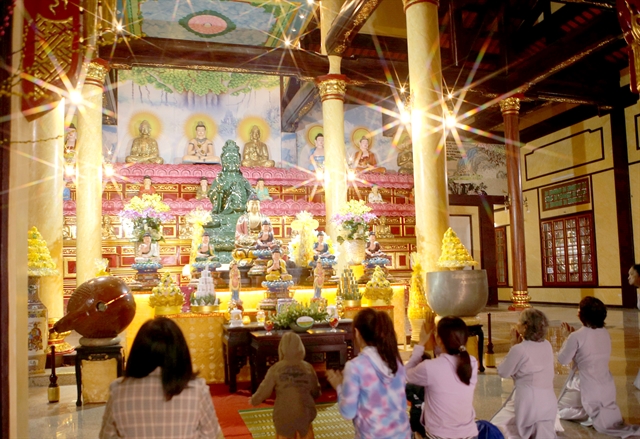.jfif) Opinion
Opinion

 |
| Buddhists and people pray for peace for their families at the Avalokitesvara Bodhisattva Festival on Ngũ Hành Sơn Mount, Đà Nẵng City, in March 2023. — VNA/VNS Photo Trần Lê Lâm |
HÀ NỘI — The Party and State have affirmed that national and religious solidarity forms the main driving force for national development, and have advocated eliminating prejudice and discrimination based on racial, social or religious status.
In his article titled "Religious solidarity for national development", Chief of the Office of the Government Committee for Religious Affairs Nguyễn Văn Long said the Constitutions from 1946 to 2013 consistently demonstrate the Party and State's viewpoint on religious affairs and beliefs.
The Party has stated that religion is a spiritual need of a segment of the population and will continue to exist alongside social development. Religious solidarity and national harmony are crucial to building the rule-of-law State.
Over the past 20 years, there have been more than 30 legal documents stipulating religious activities and beliefs, and amending provisions on freedom of belief and religion, such as Ordinance 21/2004/PL-UBTVQH11 on beliefs and religious affairs, Decree 22/2005/NĐ-CP guiding the implementation of certain provisions of the Ordinance, and Directive 1940/CT-TTg on land related to religions. The 14th National Assembly also adopted the Law on Belief and Religion, and the Government issued Decree 162/2017/NĐ-CP detailing articles and measures for the implementation of the law.
In fact, over the past nearly two decades (2003-2022), the number of religious dignitaries, assistants, and places of worship has significantly increased, reflecting people's need for belief and religion, as well as the consistent policies of the Party and State in ensuring freedom of belief and religion for all.
In 2003, there were six religions with 15 organisations, 17 million followers, approximately 20,000 places of worship, 34,000 religious dignitaries, and 78,000 religious assistants nationwide. Last year, the State recognised 43 organisations from 16 different religions, with around 27 million followers, over 53,000 religious dignitaries, some 135,000 religious assistants, and more than 29,000 places of worship.
Each year, there are over 8,000 religious and belief festivals with the participation of tens of thousands of followers. During 10 years of implementing policies and laws on belief and religion, competent State agencies have provided hundreds of hectares of land to build worship facilities. HCM City, for example, has allocated 7,500sq.m of land to the General Confederation of the Evangelical Church of Việt Nam (South) to build the Alliance Evangelical Divinity School. The Central Highlands province of Đắk Lắk has also provided more than 11,000sq.m to the Buôn Ma Thuột Bishop's Palace. The central city of Đà Nẵng allocated some 9,000sq.m to the Đà Nẵng Bishop's Palace, and the central province of Quảng Trị handed over 15 hectares to the La Vang Parish.
Last year, all-level authorities licensed the construction, repair and renovation of 152 places of worship, the registration for concentrated religious practices of 183 groups; and the issuance of 140 publications, with over 684,250 copies.
The ordination, promotion, appointment and transfer of dignitaries and assistants; the establishment of affiliated religious organisations; the amendment of charters and regulations; and the registration for annual programmes were carried out in accordance with legal regulations.
In the year, 646 people were approved to be ordained and nominated as dignitaries; 3,238 appointed, elected and nominated as assistants; and 424 assistants transferred in accordance with regulations.
This is a vivid testament to the assurance of freedom of belief and religion, and also the consistent and lodestar principle of the Vietnamese Party and State, and the nature of the democratic, rule-of-law State, for the spiritual life of millions of religious followers.
In fact, guidelines and policies on belief and religion are not only enshrined in the Constitution and laws, but also vividly reflected in daily life as they constitute one of the fundamental rights of the people. Most of the religious organisations tend to work in harmony with the nation, concurrently playing a role in nurturing and preserving the Vietnamese culture.
The Party’s institutions and policies on religions also affirm that the relationship between the rule-of-law State and religions is an objective reality, and that beliefs and religious activities represent the spiritual need of a segment of the population, which always exists in social life. Therefore, they should be under the State’s guidance and management to ensure that the activities satisfy the legitimate, healthy spiritual need of all, and to limit and eradicate superstition and deviance harming the moral values and good traditions of the nation.
The Party’s policies on beliefs and religious affairs have promoted the responsibility of the executive agencies, creating a stable legal framework for beliefs and religious practices.
Authorities’ responsibility in guiding and addressing petitions of religious organisations and individuals has been clearly defined, thus ensuring transparency and publicity in performing their duties. — VNS




